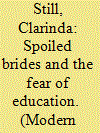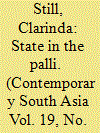| Srl | Item |
| 1 |
ID:
106500


|
|
|
|
|
| Publication |
2011.
|
| Summary/Abstract |
This paper examines female education, marriage and honour among upwardly mobile Dalits. Using data collected during fifteen months of ethnographic fieldwork (2004-2005) in a Dalit community in rural Andhra Pradesh, I describe how families who constitute the upper strata of Dalits are educating their daughters in order to marry them 'upwards' within their caste to a groom with prospects of employment. Education allows these Dalit girls to become housewives, escaping a life of demeaning agricultural labour, colloquially: 'hard work in the hot sun'. But as educated wives they must have middle-class virtues to match. Unlike their labouring counterparts, their language, dress, movement and manners must convey shame and modesty. As their responsibility for maintaining family honour increases, they are progressively more scrutinised and controlled. I explore this heightened emphasis on honour among traditionally egalitarian Dalits and suggest reasons for the increasing concern about female sexuality. Education for girls is seen as a particularly risky business: on the one hand it provides opportunities for sexual encounters, but on the other hand it holds the promise of hypergamy. Given their already precarious circumstances, many Dalits choose to cut short the education of their daughters, rather than take the risk.
|
|
|
|
|
|
|
|
|
|
|
|
|
|
|
|
| 2 |
ID:
107226


|
|
|
|
|
| Publication |
2011.
|
| Summary/Abstract |
In this paper I examine Dalit attitudes towards the state in Andhra Pradesh. In this part of India, Dalit lives and physical surroundings are quite literally shaped by the state and encounters with state officials in various guises are frequent. I argue that Dalits' dealings with the state have led them to a view which is essentially pragmatic: they see the state in terms of what they can extract from it. While their experiences with local bureaucracy are often frustrating and sometimes humiliating, they nevertheless regard the state as a resource which potentially can be tapped for their advance. Indeed, in light of the disintegration of patronage and heightened caste conflict, they are forced to turn to the state for assistance. The conflict between the two major Dalit castes themselves and between Dalits and the dominant castes over reservations also shows how central state resources are to Dalits' sense of identity. Contrary to much of the literature, then, I suggest that many of the most marginalised believe the state can assist their advance and demand that their political representatives harness state power to work in their interests.
|
|
|
|
|
|
|
|
|
|
|
|
|
|
|
|